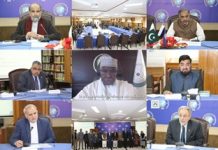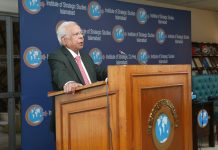A 7-member delegation of Pakistani think tanks was invited to visit China at the invitation of China Center for Contemporary World Studies (CCCWS) in Beijing from August 22-September 1, 2013. The delegation was led by Najam Rafique, Director (Americas/Programs), at the Institute of Strategic Studies, Islamabad (ISSI) along with three other members from the institute including Ghani Jafar Malik, Editor and expert on Iran, Qasim Mustafa, Research Fellow (Arms Control & Disarmament) and Anjum Saeed, Research Fellow (China). The three other members from different think tanks based in Islamabad included Imtiaz Gul, Executive Director Centre for Research & Security Studies, Ms. Heba Al-Adwey, Research Fellow, Institute of Regional Studies and Mr. Nadeem Farhat Geelani, Research Fellow, Institute of Policy Studies.
The visit was in continuation of MoU signed on behalf of the ISSI between CCCWS and Tariq Fatimi, special assistant on foreign affairs to Prime Minister Nawaz Sharif during the latter’s visit to China in July 2013.
In the first phase of the visit, the delegation visited Beijing where it held extensive interactive meetings with the members of CCCWS on matters relating to relations between Pakistan and China, particularly with regard to the establishment of an ‘Economic Corridor’ between the two countries and how to take this process forward. Later, the Head of the Pakistani delegation held a one-on-one meeting with the President of CCCWS, Dr. Yu Hongjun and discussed Pakistan-China relations. Najam Rafique again emphasized the purity of relations between the two countries and said that while there were issues of security and energy shortages in Pakistan, these were matters that Pakistan will be able to overcome in order to ensure the viability of the economic corridor. He emphasized that Pakistan sees this corridor not only as having economic, but strategic connotations as well that will be to the larger benefit of not only South Asia, but beyond the wide sweep of countries connected by the ancient Silk Road. Furthermore, he said that we are well aware of Chinese concerns relating to terrorism in Xinjiang Province and both sides should work together to combat the menace of terrorism. The president of CCCWS suggested that both CCCWS and ISS need to develop and strengthen academic programmes including holding of joint conferences, seminars, lecture series by distinguished speakers and a scholar exchange program. He expressed his desire for a delegation of CCCWS to visit Pakistan anytime next year. They also discussed the current situation in Afghanistan and China-Pakistan cooperation after the US withdrawal from Afghanistan.
In the second phase of visit, the delegation was taken to Guangzhou, capital of Guangdong province, which is considered to be the most developed province in China. Li Jian, Deputy Director General of Foreign Affairs Guangdong Province gave a briefing to the delegation on the economic development of the province and said that the province contributes 23 percent of the total revenues of China. He emphasized on the agriculture, mining, industrial, infrastructure development capabilities and services sectors of the province. Najam Rafique emphasized that Pakistan will make full use of the development experiences of provincial government of Guangdong, and step up cooperation with Chinese companies from the province in energy, mining, agricultural and services sector projects inside Pakistan. A field investigation trip was also organized for the delegation that showcased the sustainable development of housing, schools and health facilities for the larger population of Guangdong.
In the third and last phase of visit, the delegation was taken to Urumqi, Xinjiang autonomous region. Song Xue feng, Deputy Director General of Foreign and overseas Chinese Affairs office Xinjiang met with the delegation and discussed the bilateral economic relations and emphasized on Gwadar-Kashgar economic corridor. Najam Rafique said that Gwadar Port is closer to Xinjiang as compared to any coastal city of China, that will prove to be a tremendous economic asset for greater good of the greater number both in Pakistan and China. The delegation visited the Chang Ji’s model village of Xinjiang where they were briefed on the resettlement project of the rural communities including housing and job opportunities in terms of collective farming projects. The Pakistani delegation expressed a keen desire for both countries to increase agricultural cooperation and suggested that both Pakistan and China need to establish a mechanism for exchange of agriculture expertise including seed development and technological exchange for enhanced agricultural production.
The visit helped the Pakistan delegation and the Chinese hosts, to have a better understanding of the future needs of the two countries in order to work on a sustainable academic, economic, political and cultural cooperation.













